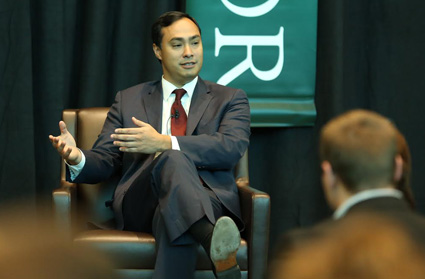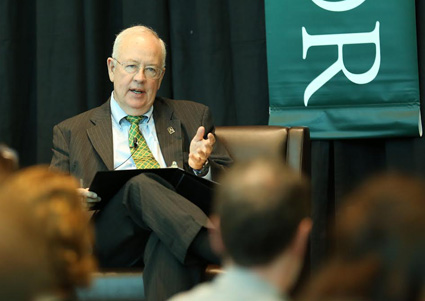By Ken Camp and Jeff Brumley
A politician’s challenge that the faith community put a human face on poverty can happen only if Christians build relationships with the poor and hungry, according to a Baptist minister who lives and works with impoverished populations.
U.S. Rep. Joacuin Castro, D-San Antonio, told the Together at the Table Hunger and Poverty Summit at Baylor University that the religious community can help debunk myths about poverty and personalize the plight of people in need.
“We have to demythologize hunger and poverty. … There are many folks, unfortunately today, who are detached from the facts about poverty in our country,” said Castro, pointing to unfair stereotypes about lazy people who abuse public assistance.

“At some point in our nation, we went from giving people the benefit of the doubt to assuming the worst,” he said. Castro noted the challenges faced by the working poor, including some who labor at multiple jobs but cannot earn a living wage.
Castro said he feels grateful for and impressed by faith community efforts “to humanize poverty, to give a human face to poverty, and to remind us of the traditions in the Bible where aid to the poor is fundamental in Christianity.”
Building relationships vital
But doing that isn’t as simple as it may sound, said Joshua Hearne, executive director of Third Chance Ministries and abbot at Grace and Main Fellowship, a new monastic community in Danville, Va.
To be able humanize the homeless or hungry, Hearne said, it’s necessary to do more than donate clothing or food to ministries that serve those populations, Hearne, who was not at the summit, told ABPnews/Herald. Even simply serving in food lines is often not enough.
What’s necessary is to forsake comfort zones for the risky business of building relationships — and even friendships — with those in need, Hearne said.
Engaging in “poverty tourism” — where individuals or groups parachute into ministries for brief periods of service — do nothing to build relationships between those doing the giving and those in need.
“The most important thing is to have actual reciprocal relationships with people whose lives are different from our own.”
It will be hard for large numbers of Christians to demythologize anyone without doing so, he said. But eating with, instead of simply serving, the poor makes it much easier to do what Castro’s suggesting.
“It’s easy to dismiss ‘the homeless,’ but it’s very difficult to dismiss someone we have dinner with every week,” Hearne said.
‘Demythologize poverty’
“What the faith community can do first and foremost is demythologize poverty and help people understand there is, of course, a preeminent place for compassion in American society as we approach these challenges.
“Religion can help ease the tensions that sometimes divide us. … The faith community is a thread that can bring people together. … When it works best, faith brings people together in the strongest way possible, perhaps in a way nothing else can,” he said, citing the example of evangelical Christians in calling for immigration reform.

Castro participated in a question-and-answer session with Baylor President Ken Starr in the concluding session of the Hunger and Poverty Summit, sponsored by the Texas Hunger Initiative in conjunction with Feeding Texas and the U.S. Department of Agriculture Food & Nutrition Service Southwest Regional Office.
Castro told his family story, which Starr called “an embodiment of the American dream.”
A family meets the American dream
Castro described how his orphaned grandmother moved from Mexico to Texas at age 6 with her 4-year-old sister to live with her closest surviving relatives.
She never made it beyond the fourth grade and worked as a maid, babysitter and cook to provide for her only child, Rosie, Castro’s mother.
Castro’s mother was the first member of her family to attend college, and she became a political activist.
Castro and his brother, Julian — former San Antonio mayor and now U.S. Secretary of Housing and Urban Development — both graduated from Stanford University and Harvard Law School.
“My story is like the story of so many Americans,” Castro said, characterizing his family narrative as “common to so many of our families.”
However, both moral responsibility and enlightened self-interest should inspire the United States to do more to enhance opportunities for socio-economic advancement, he insisted.
“I believe that just as there is an infrastructure of transportation … the beauty of America is that we can all come together to build out an infrastructure of opportunity that allows each of us to get where we want to go in life,” Castro said.
The “infrastructure of opportunity” not only means providing better access to quality education and health care, but also creating a climate for economic growth, he noted. In terms of public policy, he pointed to the need to increase the minimum wage and expand Medicaid in Texas.
Assign blame accurately
“We didn’t get into $18 trillion [national] debt because we helped poor people too much,” he said. “We got into this problem because there was a select group of very wealthy people, mostly on Wall Street, who quite frankly helped wreck the economy.”
“We’ve got to remember that when we start to assign blame on those who are on the lower socio-economic rungs. … We need to be honest and accurate about how we got here.”
At the same time, Castro called for case management strategies to move individuals and families who receive public assistance from dependency to self-reliance.
“We need, essentially, an exit strategy. Say: ‘We’re going to help you out when you need it. What is the exit strategy to help you get you back on your feet?’” he said.
Coming together
Jeremy Everett, director of the Texas Hunger Initiative, a project in the Baylor School of Social Work, launched in partnership with Texas Baptists’ Christian Life Commission, echoed the same theme.
“Coming together offers the only answer to the question of hunger and the only solution to the problem of poverty,” Everett said.
